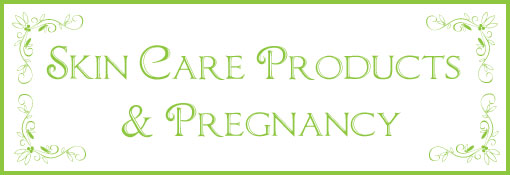When I got pregnant second time around, I started doing a little research on which of my skin care products were OK to continue using and which I should avoid. My skin has been a mess with both pregnancies with breakouts galore :-(. Who are these people that get the “pregnancy glow?!” I am definitely not one of those people. Thank goodness for make-up and cover up!
I consulted Kristin Scott, who is a licensed Skin Care Therapist with Healthy Skin Naturally in Costa Mesa, to see if she could write me some basics to share on my blog. By the way, this company has the BEST daily 30 SPF moisturizer I have ever used. Super light and non-greasy. You can find contact information for Kristin at the bottom of the article. And, of course, if you are pregnant, it is best to always check with your doctor on any products in question. Here is what she writes:
“Did you know there are skin care ingredients to avoid during pregnancy? Some ingredients that are commonly found in skin care products and cosmetics are suspected of being able to make their way through the placenta. But DON’T PANIC if you have used a product that contains one of the suspected ingredients; simply stop using it and pick one without them. And if you plan to breastfeed, continue avoiding them until you stop nursing, when you can safely resume using them again.
What Skin Care Ingredients Pregnant Women Should Avoid:
Little – and often contradictory – testing and research has been done in the area of pregnancy and skin care products. Since it is difficult to test on humans (who would volunteer for that job?), testing of these ingredients has been done mainly on lab animals. However according to some experts on websites like Natural Living, SafeFetus, Baby Center, and All Experts, you should try to avoid products containing:
Salicylic Acid, chemically similar to aspirin, is found in products used to treat acne and anti aging products. Tests performed on pregnant patients who took an oral form (not topical form) of Salicylic Acid were found to have the same complications found in women who took aspirin during pregnancy. While the topical form of salicylic acid has not been tested, most health care professionals recommend steering clear of using any ointment containing this ingredient during pregnancy. However, many MDs seem to agree that small amounts applied to the skin — such as a salicylic acid-containing cleanser used once or twice a day — are considered safe. The more urgent concern seems to be with ointments and face peels containing higher concentrations of salicylic acid, which would be similar to taking one or more aspirin when pregnant.
Benzoyl peroxide and Hydrocortisone are also found in many products used to treat acne. As with salicylic acid, the topical form of benzoyl peroxide and hydrocortisone have not been tested on pregnant women, yet some health care professionals recommend avoiding them.
Retinol A, a form of Vitamin A, is also used to treat acne and found in products like prescription strength Retin A. High doses of Vitamin A have been proven to be harmful to a fetus; however most experts agree that retinoids have not been shown to cause problems in their topical form. However, all studies say to STAY AWAY from the oral form of the retinoid Accutane.
What Is OK for Pregnant Women?
The best ways for taking care of yourself and your baby is to keep your pregnancy skin care routine simple, avoid harmful ingredients, and protect your skin from the sun. If you have no major skin problems, cleanse with a mild cleanser, use a light moisturizer at night; and apply a moisturizer with a sunblock in the morning. If you are breaking out ask an experienced skin care professional to recommend more therapeutic and oil-free products.
According to many experts, if acne treatment is necessary, generally a mild antibacterial cleanser or toner with salicylic acid, benzoyl peroxide, or hydrocortisone is considered safe. An occasional dab of a milder strength benzoyl peroxide on a difficult pimple may be just fine, just don’t slather it all over your face every day. If you’re dealing with severe pregnancy-induced acne, a dermatologist can possibly give you a safe topical antibiotic crème.
Using sunscreen during pregnancy is more important than ever. Hormonal changes can make the skin more sensitive to strong sunlight, causing dark brown splotchy areas called the mask of pregnancy or melasma. It usually fades after pregnancy but if you religiously wear sunscreen you should be able to avoid it. Look for ones that contain transparent zinc oxide or titanium dioxide that don’t penetrate the skin.
Does it seem that practically every product you currently use has an ingredient that is best to avoid during pregnancy? This is the time to consult with your health care professional to review what you’ve been using and adjust for this special time in your life. The good news is that regardless of what you think, you never looked better than with your pregnancy glow — so put away the magnify mirror for awhile!”
If you would like further information or would like recommendations for skin care services or products during your pregnancy and beyond, Kristin may be reached at (949) 548-0702, (800) 778-8332 or by emailing nattech@pacbell.net.

I will recommend not to hold off until you get enough amount of money to order different goods! You should take the business loans or just sba loan and feel comfortable